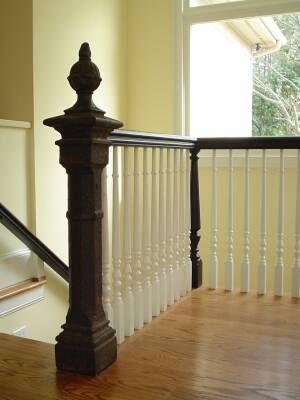

REAL ESTATE INSPECTION
It is recommended that you always have a general home inspection as well as any surveys and inspections in specialized areas beyond the scope of the general home inspection.
The inspector you use is your choice and it is a good idea to call around when you select one. Each inspector has his or her own qualifications, style, report format, time frame and fee structure. When you call around ask questions so you know what you can expect in the way of service, fees, time frames, and follow-up from the inspector you select.
We are unaware of any inspection firm or inspector that will give you a warranty on an inspection. This could be one of the questions you ask when you call around.
At Windermere we believe each buyer should interview and choose his or her inspector and be as much a part of the inspection process as possible. It is highly recommended that you, as the buyer, attend the inspection you schedule.
Home inspectors provide a unique customer service in identifying existing problems should there be any. There are many home Inspection companies to choose from. This list is provided for the buyer’s convenience only.
Real Estate Inspectors:
RAJ HAYDEN (Cardinal Home Inspections) 206-767-7757, 206-768-9514
DONALD LAWN (The Home Report) 206-285-7227
JIM HORTON (World Inspection Network) 206-526-1940
JOHN LANGMEYER (Pacific Northwest Building Inspection) 206-762-8969
The following are home related service providers that our past clients have been pleased with. As with inspectors, there are many more service providers such as these listed in the yellow pages or advertising In local newspapers. Again it’s possible that a member of your family or one of your friends or co-workers, knows of a service provider they were pleased with that would suit your needs.
Sewer Line Inspection:
APS Sewer Inspection and Repairs, Steve Brown 425-864.2713 or Nick Patrick
425.888.2590
Hydro Physics, Sewer Line Inspection, Rick 1-866-775-8445 $185
Pest Inspector:
DENNIS KLEIBER (All Star Pest Control) 788-4927 799-8836
STEVE ABRAMAVAGE (Terminators Pest Control) 547-4510 823-8351
Oil Tanks:
Seattle Fire Department Call to see if a permit is on file. 206-386-1400
Tanks by Dallas, Dallas Gigrich 206.365.0291
Filco Enviromental Services 206-547-8347
Oil Tank Location Service 206-241-2292 Ken Stoffel
Environmental:
Blue Sky Lab 721-BLUE
Lauck’s Water Testing 767-5060
WHY YOU SHOULD HAVE A HOME INSPECTION
As a prospective homebuyer are you sophisticated in identifying problem areas in and around your potential new home? Most of us are not knowledgeable in identifying potential problem areas. You are in the process of making a very large investment, perhaps the biggest investment you’ll ever make. For just a small investment now in a professional home inspection you may save substantial money and heartaches in the future. Can you afford to not have a professional home inspector check out the premises for the integrity of the internal and external components of the dwelling and any other structures on your future property?
WHAT A PROFESSIONAL HOME INSPECTOR LOOKS FOR
Structural: Many home inspection organizations have set standards on certain areas of the home that a home inspector will look at to determine the integrity of the essential internal and external structural components. Home inspectors are generally not structural engineers but they can identify visual defects in these areas that might require immediate repairs.
Electrical: Do the outlets all work? Does the house use fuses or is there a breaker box? Are there any visible signs of fraying on the wiring? Is the service adequate for the house? While home inspectors are generally not electricians, they are trained to point out problems in these areas.
Plumbing: Are there any leaks or potential problems? Are all the systems and fixtures working properly? Has any of the plumbing been updated?
Heating: What is the nature and condition of the heating system for the home? Is the system all of one kind or are several types of heating systems employed to heat the home? And what is the condition of the heating system. Are there any dangers you should be aware of?
Appliances: Are the appliances listed on the purchase and sale agreement in good working order?
Safety Hazards: Home inspectors are generally not environmental specialists, but they can often identify different situations that warrant further investigation. Many general safety hazards or dangerous conditions can often be identified by your home inspector.
Miscellaneous: Other items may or may not be included in a standard home inspection. Some of these may be: septic systems, drainage problems, patios, or exterior structures. It is always a good idea to be clear with whomever you hire as to what is and is not being inspected.
Normally not included: Geological or land subsidence surveys, general land/boundary surveys, or environmental and pollution inspections. These types of inspections are generally above and beyond a standard home inspection and should be completed separately for your own protection.
FREQUENTLY IDENTIFIED ITEMS DURING A HOME INSPECTION:
Earth to Wood Contact: Probably the most frequently noted condition. Any contact by dirt against a wood surface, including pressure treated wood, will eventually result in deterioration to the wood. Soil and bark dust should be removed to six inches below any wood siding.
Bushes, Shrubs and Trees: In contact with or adjacent to the siding of the home (like wood/soil contact) permits moisture build up and provides a path for wood destroying insects. Trim plants back from the side of the house at least 12 inches.
Firewood: Or any other wood or lumber should not be stored against the house.
Caulking: Tub and/or shower. Two areas of concern: (1) Where the flooring meets the tub or shower (2) all tile/surround joints. The breakdown of proper caulking is the major cause of rot in the sub-floor and wall structure surrounds (tile, marble, etc.)
Roof: Replace missing shingles or repair damaged flashing. Wood roofs should be cleaned and treated. High pressure water cleaning is not recommended as the method frequently causes damage to the wood. Cleaning by hand or with a high pressure air system is preferred. Remove or trim back any tree branches that extend over, or near the roof. Composition roofs with moss buildup may be treated to both eliminate the moss and enhance the appearance.
Gutters: Should be completely clear of all foreign material. Check the opening at the downspout to be sure it is draining properly. Add gutter screens if possible. Repair any sagging or bent gutters and any leaking joints.
Downspouts: Check to make sure they are draining properly. If they terminate directly onto the ground, add splash blocks to divert water away from house. If they terminate into the ground verify that proper drainage occurs by running water into the drain tile. (“Ponding” water from improper downspout runoff is a major cause of flooding in a crawl space or basement.)
Crawl Space: This is another area where adverse conditions are frequently noted. Remove all storage from around the access hole. Remove all wood scrap, cardboard and other debris. Any fallen insulation should be repaired or replaced. Check for any obvious leaks at traps and toilets. Check to make sure that all ventilation holes are clear and have not been covered. (Hint: older homes generally do not have adequate ventilation.)
Hot Water Tank: Requires proper venting and safety release discharge valve. Tanks heated with natural gas should have earthquake straps. (Draining/flushing a hot water tank at regular intervals will significantly increase the life span.)
Attic: Check to make sure that exhaust fans do not vent into attic. Also look for signs of roof leakage. Clear anything that is blocking ventilation.
Toilets: Frequently loose. Tighten the closet bolts that hold it down (not too tight, it could crack the base). If the base is leaking you can replace the wax ring and closet bolts with new ones.
Porch/Deck: Check the deck/porch flooring and replace damaged material. Check the railing-many decks have very loose railings. Often elevated decks lack proper sway braces and bolted attachment to the house that can be easily added. Again, make sure that any deck support posts do not have any earth-wood contact at the base.
Appliances: Verify that all of the top elements on the range are working and replaced if needed. Check that all of the oven features work. Make sure that the kitchen vent works properly. Inspect the dishwasher particularly for door seal leaks.
